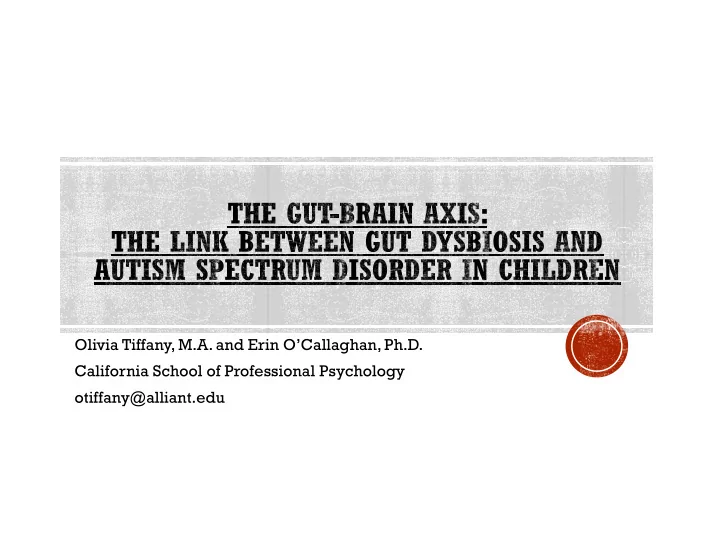

Olivia Tiffany, M.A. and Erin O’Callaghan, Ph.D. California School of Professional Psychology otiffany@alliant.edu
Autism Spectrum Disorder (ASD) is a neurodevelopmental disorder, occurring in 1 in 59 children. Research demonstrates that rates of ASD are rapidly increasing. The etiology of ASD includes toxin exposure, diet, genetics, and the gut microbiome. Research indicates that children with ASD consistently suffer from gut dysbiosis. Bi-directional communication between the central nervous system (brain) and the enteric nervous system (gastrointestinal track) impacts behavioral, cognitive, and social deficits in ASD children (Sivamaruthi et al., 2020). This poster presentation will describe the connection between gut dysbiosis and ASD symptoms in children, environmental factors which affect gut health, and microbiome interventional strategies.
§ Characterized by some or all of the following: v Impairment in interactive and social communication abilities v Deficits in emotional understanding and recognition v Rigid and repetitive patterns of activities and behaviors v Possible self-injurious behaviors v Abnormal sensitivity v Gastrointestinal (GI) difficulties
§ Bi-directional communication between the Central Nervous System (brain) and Enteric Nervous System (stomach) (Sivamaruthi et al., 2020) § Connects emotional and cognitive centers of the brain with intestinal functions § Dysregulation in the CNS changes the composition of the gut microbiome and its balance of ’good’ and ‘bad’ bacteria à gut dysbiosis (Forssberg, 2019) § Gut dysbiosis negatively impacts the hypothalamic pituitary adrenal axis (HPA axis), which is involved in stress control, cortisol release, and emotional response § The gut microbiome impacts the brain by controlling the release of neurotransmitters, like: serotonin, gamma amino butyric acid (GABA), and brain- derived neurotrophic factor (BDNF) (Sivamaruthi et al., 2020)
§ The gut microbiota is a large contributor for overall health § Gut dysbiosis: imbalance of beneficial and pathogenic bacteria in the gut § Gut dysbiosis can lead to... v Gastrointestinal (GI) tract disorders v Central Nervous System Disorders v Mental Health Disorders § Leaky gut: pathogenic bacteria in the gut creates neurotoxic chemicals, which escape the gut, enter the blood stream, and impact the neurotransmitters in the brain (Sivamaruthi et al., 2020) § 90% of individuals with ASD are shown to have GI discomfort, gut dysbiosis, and leaky gut (Nitschke et al., 2020) § Immune dysregulation in ASD is linked to dysbiosis in the gut microbiome
(Sivamaruthi et al., 2020)
§ Maternal health risk factors § Mode and timing of delivery § Diet § Antibiotic use
§ Maternal risk factors v Link between maternal infection + ASD in offspring v Imbalance in mother’s microbiome will be transferred to the baby (Sivamaruthi et al., 2020) v Maternal immune activation during pregnancy § Mode and timing of delivery v The composition of a baby’s gut microbiome is impacted by method of delivery (vaginal birth vs. cesarean section) (Nitschke et al., 2020) v C-section babies have a less diverse microbiome v Pre-term babies have a higher risk for developing ASD
§ Diet v Maternal diet contributes to ASD development in offspring (Forssberg, 2019) v Increased intake of folate/folic acid and a multivitamin decreases risk of ASD v Breast fed vs. formula fed à Breast feeding often absent in ASD children v ASD children are selective with food à leads to challenges in gut composition (Nitschke et al., 2020) § Antibiotic usage v Antibiotic usage in the first three years of life can have detrimental effects on a child’s microbial composition in the gut (Sivamaruthi et al., 2020) v ASD is correlated with maternal use of antibiotics v Use of antibiotics in mothers during their 2 nd and 3 rd trimesters increased risk of ASD by roughly 50% (Nitschke et al., 2020)
§ Evidence shows success in re-populating and rebalancing the gut microbiota as a form of treatment for ASD and other gut connected conditions v Dietary and supplement interventions v Prebiotics v Probiotics v Fecal microbiota transplant
§ Dietary and supplement interventions v Due to high food selectivity and issues in food digestion, ASD children lack dietary fibers, vitamins, and minerals à need multivitamin v Supplement Omega-3 fatty acids (fish oil) (Nitschke et al., 2020) v Gluten-free and casein-free diet has positives impacts on gut health and ASD behaviors § Prebiotics v Prebiotics in natural foods stimulate growth of microbial strains § Probiotics v Alters fecal microbiota v Increases beneficial bacteria and decreases pathogenic bacteria in the gut § Fecal microbiota transplant v Transferring fecal samples from healthy donor to recipient to dissolve gut dysbiosis (Chen et al., 2020)
Chen, K., Fu, Y., Wang, Y., Liao, L., Xu, H., Zhang, A., ... & Fang, B. (2020). Therapeutic effects of the in vitro cultured human gut microbiota as transplants on altering gut microbiota and improving symptoms associated with autism spectrum disorder. Microbial Ecology , 1-12. Forssberg, H. (2019). Microbiome programming of brain development: Implications for neurodevelopmental disorders. Developmental Medicine & Child Neurology , 61 (7), 744-749. Nitschke, A., Deonandan, R., & Konkle, A. T. (2020). The link between autism spectrum disorder and gut microbiota: A scoping review. Autism , 1362361320913364. Sivamaruthi, B. S., Suganthy, N., Kesika, P., & Chaiyasut, C. (2020). The role of microbiome, dietary supplements, and probiotics in autism spectrum disorder. International Journal of Environmental Research and Public Health , 17 (8), 2647.
Recommend
More recommend